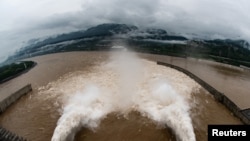While welcoming China’s decision to share hydrological data with Mekong nations, experts said the next step would be to expand the information shared and to make this data accessible to citizens and communities who most need it.
The Mekong River Commission (MRC) and China’s Water Resource Ministry signed an agreement last week to share hydrological data twice a day from two stations on the upstream – the mainstream dam in Yunjinghong and another at Manan, both in Yunan province, according to the Mekong River Commission.
An Pich Hatda, chief executive officer of the MRC’s secretariat in Vientiane, Laos, said Beijing’s willingness to share dry-season data could serve as an “unprecedented event” after 18 years of requests.
“It’s a good start...since this data will assist the Mekong River Commission to better study the river’s water levels, especially during the dry season,” An Pich Hatda told VOA Khmer.
The commission, he said, was not only hoping to get more data from China but also wanted downstream member states to increase their data sharing as well.
At an online discussion organized by the Cambodian Institute for Cooperation and Peace, Brian Eyler, one of the panelists, said China’s decision to share more data was a welcome move but that increased transparency was needed on all upstream dams, not just the two stations included in the agreement.
“But the question is: can there be more? When data sharing agreement is still very limited to two stations where there are upstream dams [that] are not included – that should be included – in the agreement,” said Eyler, who is the director of U.S.-based Stimson Center’s Southeast Asia program.
A U.S.-funded report published in April by research firm Eye on Earth suggested that China was not releasing water from its dams, despite heavy precipitation, causing severe drought in downstream nations in 2019. The Chinese government has challenged this claim as spurious.
Watcharas Leelawath, former director of the Mekong Institute, said during the CICP conference that multilateral agencies, China and the Mekong nations should work on standardizing this commitment to data sharing and set a baseline of data needed to analyze water level calculations, droughts and flooding.
Kol Vathana, deputy secretary-general of the Cambodian National Mekong Committee, agreed that it would be better for China to provide more upstream data, especially at stations closer to Cambodia.
“For example, if they provide us data from only a few stations closest to us, we will know [information] from these downstream stations. What if any upstream dam that keeps the water and is not releasing it, we will know it,” Vathana told VOA Khmer by phone.
Kol Vathana said downstream nations lack a legal mechanism to hold China accountable for its commitment to data sharing efforts, and these issues would have to be handled with “care.”
Stimson Center’s Brian Eyler added that Mekong-related information should be transparent and citizens and scientists should be given access to this information, so they are equipped with the knowledge to make the best decisions for their communities.
“Transparency is not just about governments sharing data – it is about getting the information to the communities that need the information right and also have the citizens and scientists’ people who are living along the river equipped with some knowledge on how to report on conditions, feeding them information on the decision-making process as well,” he said.
Officials at the Lancang Mekong Water Resources Cooperation Center in Beijing did not respond to VOA’s request for comment.









